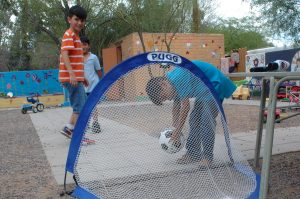
Tucson, Arizona, Jul 16 (EFE).- Shelters like Tucson’s Casa Alitas look like oases to immigrant families seeking asylum, somewhere to rest and relax after crossing the Mexican desert and before dealing with the inhospitable US immigration system.
This moment of peace is reflected on the walls of Casa Alitas, which are covered with colorful drawings by immigrant children who have found refuge here.
There are also toys and teddy bears that welcome the migrant families that arrive at its door after being released by US Immigration and Customs Enforcement (ICE) following their processing and interview at a port of entry, the first step in applying for asylum.
“We’re facing a humanitarian crisis – families fleeing from violence keep arriving at our border and we can’t just shut the door on them,” Ali Hofer, one of the managers of the shelter established in 2014, told EFE.
Official figures show that during the current fiscal year, which began last October 2017, no less than 96,236 people have showed up at ports of entry along the border.
In Casa Alitas, the migrants receive food, a place to sleep, clean clothes and are allowed to communicate with their families.
They even get help buying the bus or plane tickets needed to reach their final destination.
Arriving at this shelter, operated by Catholic Community Services of Southern Arizona, was Mexican immigrant Estela Carranza together with her children: Felipe, 8, and Teresa, 6.
She considered herself lucky because she was able to enter the United States after presenting herself at the port of entry in Nogales, Arizona, where she applied for political exile, alleging that her life “was in danger.”
“They sentenced us to death, destroyed my home and my business, they threatened us with guns – if I’d stayed another day, I don’t know what would have happened,” she said, recounting that her family was the target of criminals ever since Estela went to the police about the murder of her 15-year-old daughter.
The Mexican said she had heard about the “zero tolerance” policy of the Donald Trump government against undocumented immigrants and that it initially meant the separation of some 3,000 minors from their parents.
Estela, 44, was very afraid she would be separated from her children, but they were released
